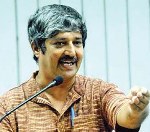R Ramanujam
Eminent Speaker
Short CV:
R. Ramanujam got his BE (Hons) in Electrical and Electronics Engineering from BITS Pilani and his PhD in Computer Science from Tata Institute of Fundamental Research, Mumbai. After postdoctoral research at the City University of New York, he has been at the Institute of Mathematical Sciences, Chennai where he is currently Professor.
His research interests are in mathematical logic and theory of computation, and their applications to theory of distributed systems, game theory and security theory. He is currently on the editorial board of ACM Transactions on Computational Logic. In 2010, he was Lorentz Fellow of the Royal Netherlands Academy of Sciences at the Netherlands Institute for Advanced Studies. He has been actively involved in the Indian Association for Research in Computing Science and the Associaton for Logic in India.
Ramanujam has been associated with the Tamil Nadu Science Forum since 1990, active in its involvement in science popularization and school education. He is editor of Thulir, a monthly science magazine for children. He was a member of the Yash Pal Committee that formulated the National Curriculum Framework 2005, and chaired the National Focus Group on Teaching of Mathematics, NCERT. Currently he is Vice President of the Mathematics Teachers Association of India, and a member of the Core Committee of CS Pathshala, an ACM India initiative.
Title of Talk 1: Why should we learn logic, and why should we learn logic?
Synopsis: Computer science curricula do not usually advertise the fact that computers, programming and models of computation all arose from trying to answer fundamental questions in logic. But is it only a matter of historical pride? Could learning logic actually be useful for those who actually do things (and not just theorize)? Even if that is true, should it not be sufficient for a few to write formulas and such, while most of us build "apps"? These are reasonable questions for a computer science student to ask, and the talk is an attempt to engage in a discussion with her.
Title of Talk 2: Game theory for the internet age
Synopsis: What does a cake have in common with bandwith? Well, everyone wants as large a piece of it as one can get away with, though we all know we must share. When several people have selfish, potentially conflicting, goals but also must cooperate to achieve something, game theory is the natural realm. Instead of people, consider geographically distributed processes sharing resources across the globe, and you see the connection to computing. In the modern era of computing agents acting autonomously and interacting with each other, strategic reasoning and algorithms combine in new ways, posing new challenges and new opportunities. The talk is an invitation to this fascinating emerging area of research.
Title of Talk 3: Does she know that I know that she does not know P?
Synopsis: Almost all reasoning about security is reasoning about knowledge and ignorance; not only knowledge of agents, but also knowledge of knowledge/ignorance of other agents. As security becomes more important, we realise that it cannot be merely an "add-on" sitting on top of a system that has been designed without security in mind. Hence the search for underlying logical principles for reasoning about security. In this talk, we illustrate such reasoning with a few examples, hopefully without any explicit resort to cryptography.

Qualifications: Ph.D. (Computer Science)
Title: Professor
Affiliation: Institute of Mathematical Sciences, Chennai
Contact Details: [email protected]